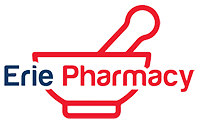
Top Veterinary Compounding Pharmacy in Pennsylvania
Erie Pharmacy provides custom compounded medication for animals. Veterinary compounding is the process of combining, mixing, or altering ingredients to create a medication tailored to the needs of an individual animal. Compounding animal drugs is a joint venture between pharmacists and veterinarians.
A Veterinarian prescribes all kinds of medications like antibiotics, parasite preventatives and anti-seizure medications for pets and farm animals. If the available drug options are not appropriate for your pet’s particular condition, you will need a compounded medication.
Here’s what you should know about veterinary compounding and what it will provide to your loving pets.
A compounded drug is a customized form of an FDA-approved animal drug. Veterinary compounding must be done either by a veterinarian or a compounding pharmacist who has received a prescription from the veterinarian. Compounded drugs are created on a case-by-case basis for a specific patient, and they are not created in bulk.
Why pets need medications from a veterinary compounding pharmacy?
- When a medication is no longer commercially produced
- To mix one or more drugs for easy administration
- To customize the strength of the medication dose
- To change a particular drug’s route of administration
When the factory-made medication is not suitable for your pet, your vet will discuss the veterinary compounded medications. For example, maybe your dog needs a daily pill to treat hyperthyroidism but rejects tablets that are hidden in her food.
What are the different forms of veterinary compounded medications?
The most common forms of compounded drugs used in veterinary medicine are capsules, transdermal gels, and flavored suspensions.
Transdermal Medication:
Transdermal medication is a topical treatment made by suspending the active ingredient of a medication in a gel or cream form. The medication is administered by rubbing a prescribed amount onto a hairless area of the pet’s body, such as the inner ear, where the active ingredient is then absorbed by the skin. This type of compounded medication is typically chosen for pets that refuse to take pills.
Oral Capsules:
Oral capsules are created by combining several ingredients into a capsule that is easy to swallow for some pets.
Flavored Suspensions:
Flavored suspensions make the medication more palatable for pets. Popular flavor enhancers, such as beef, chicken, fish, peanut butter, and banana, are used for easier administration.
Compounded Tablets and Chews:
Compounded tablets and chews can be made in flavored forms as well. Some flavored options are designed to dissolve on the tongue for pets that are too sick to swallow. Soft chews are easier to administer than pills because they are considered treats.
Are veterinary compounded drugs FDA-Approved?
Compounded veterinary medications are not FDA-approved because the drug is changed to a different form. The drug’s strength may also be altered. Hence it is better to discuss compounding options with your veterinarian first because they understand your pet’s unique needs and can recommend the best course of treatment for your pet.
A compounded drug can be a life-saving option for various types of pets that are difficult to medicate. Compounded medicine is also helpful when all other treatment options have failed. In such cases, a compounded drug is usually reserved when existing drug options are not successful or not suitable for your pet’s individual needs. Compounded drugs must be prescribed by a veterinarian and filled by a pharmacist or veterinarian.
Erie Pharmacy will work closely with your pet’s veterinarian to compound custom medications because we care about the well-being of your pets.
Animal drug compounding, compounding pharmacy veterinary, compounding pharmacy veterinary medicine, veterinary compounding pharmacies, veterinary pharmacy compounding, compounded meds for dogs, cats, other pet/animal, compounding pharmacy vet med, compounded medications for pets, compounding pharmacy for pets, pet meds compounding, compounded pet medications.

